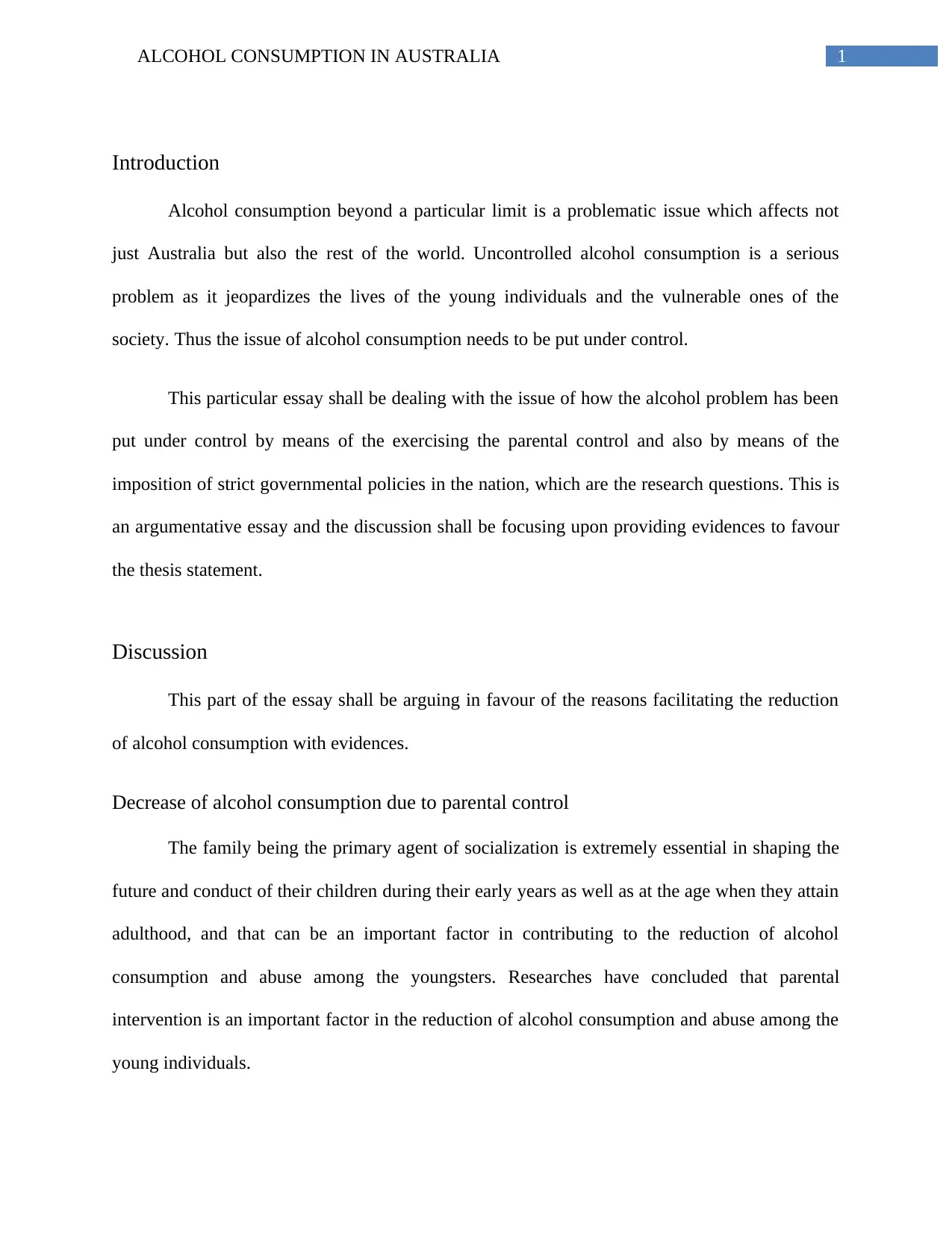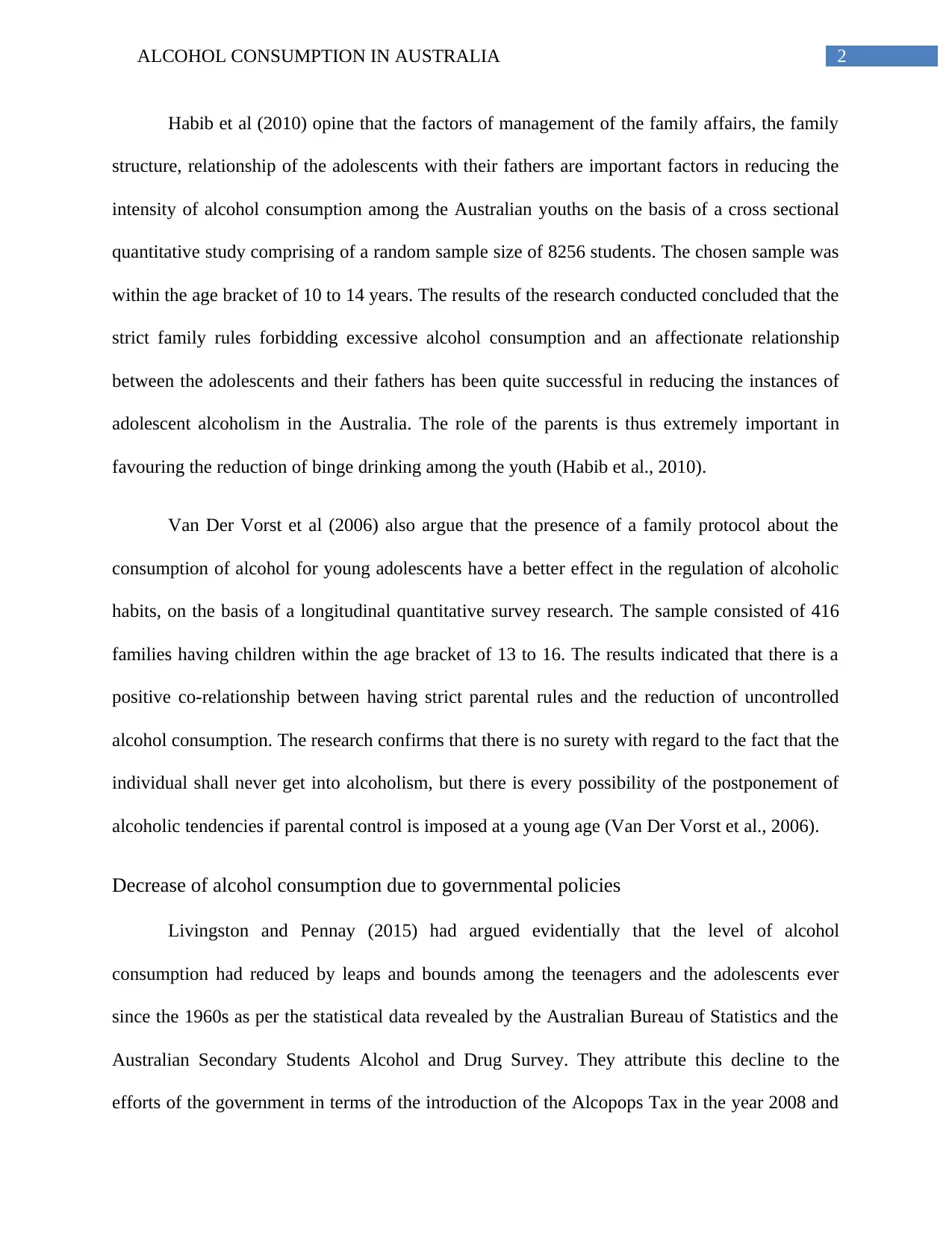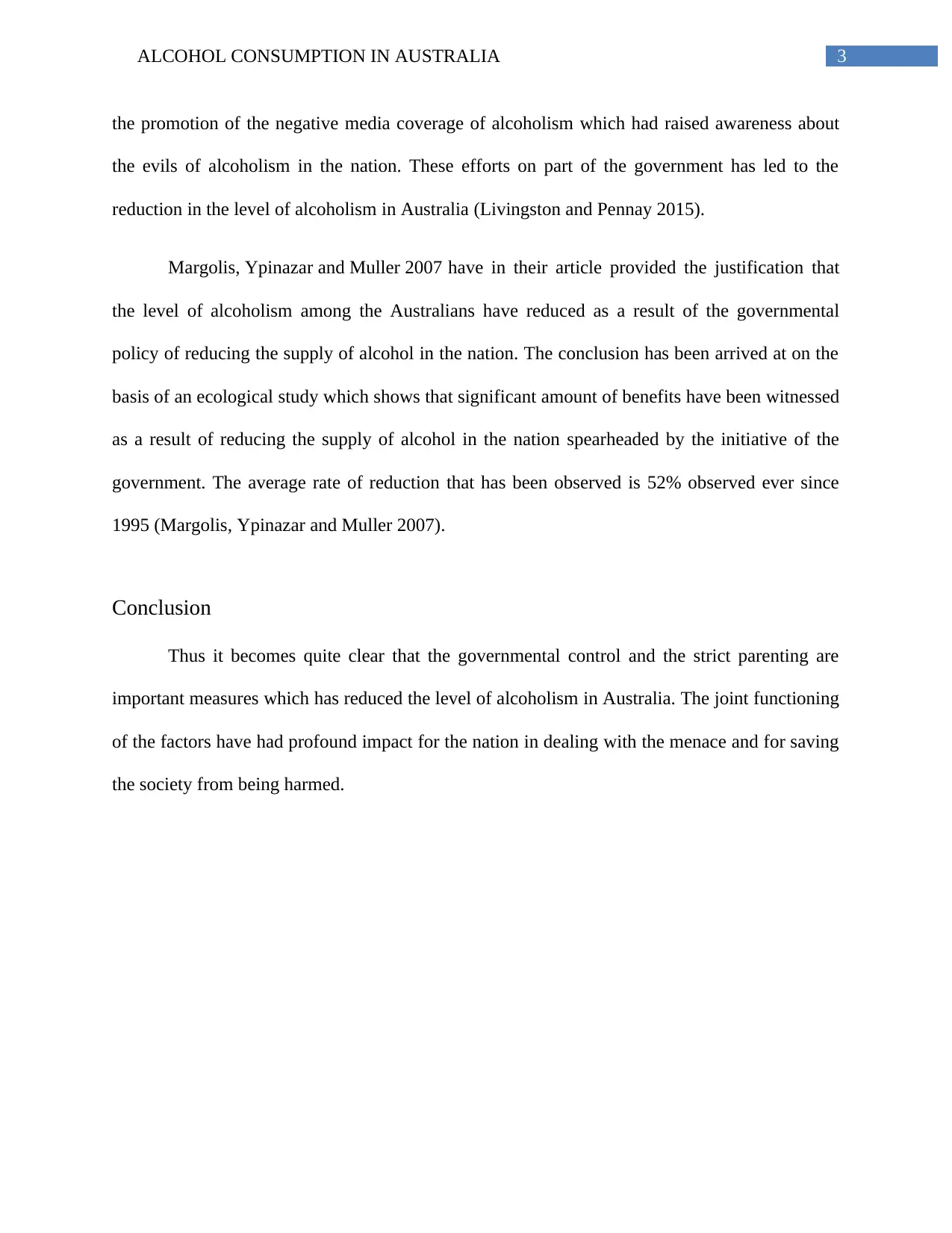Argumentative Essay: Controlling Alcohol Consumption in Australia
VerifiedAdded on 2023/03/20
|5
|1062
|96
Essay
AI Summary
This argumentative essay delves into the issue of alcohol consumption in Australia, analyzing the factors contributing to its reduction. The essay posits that both parental control and governmental policies play crucial roles in mitigating alcohol abuse. It presents evidence supporting the influence of family management, father-adolescent relationships, and strict family rules in decreasing alcohol consumption among young Australians. Furthermore, it highlights the impact of governmental interventions, such as the Alcopops Tax and media campaigns, in reducing alcohol consumption rates. The essay references studies and statistical data from sources like the Australian Bureau of Statistics, illustrating the effectiveness of these measures. The essay concludes that the combined effects of parental guidance and governmental regulations have significantly contributed to controlling alcohol consumption and safeguarding Australian society, offering a comprehensive overview of the multifaceted approach to addressing this public health concern.

Running head: ALCOHOL CONSUMPTION IN AUSTRALIA
ALCOHOL CONSUMPTION IN AUSTRALIA
Name of the Student
Name of the University
Author Note
ALCOHOL CONSUMPTION IN AUSTRALIA
Name of the Student
Name of the University
Author Note
Paraphrase This Document
Need a fresh take? Get an instant paraphrase of this document with our AI Paraphraser

1ALCOHOL CONSUMPTION IN AUSTRALIA
Introduction
Alcohol consumption beyond a particular limit is a problematic issue which affects not
just Australia but also the rest of the world. Uncontrolled alcohol consumption is a serious
problem as it jeopardizes the lives of the young individuals and the vulnerable ones of the
society. Thus the issue of alcohol consumption needs to be put under control.
This particular essay shall be dealing with the issue of how the alcohol problem has been
put under control by means of the exercising the parental control and also by means of the
imposition of strict governmental policies in the nation, which are the research questions. This is
an argumentative essay and the discussion shall be focusing upon providing evidences to favour
the thesis statement.
Discussion
This part of the essay shall be arguing in favour of the reasons facilitating the reduction
of alcohol consumption with evidences.
Decrease of alcohol consumption due to parental control
The family being the primary agent of socialization is extremely essential in shaping the
future and conduct of their children during their early years as well as at the age when they attain
adulthood, and that can be an important factor in contributing to the reduction of alcohol
consumption and abuse among the youngsters. Researches have concluded that parental
intervention is an important factor in the reduction of alcohol consumption and abuse among the
young individuals.
Introduction
Alcohol consumption beyond a particular limit is a problematic issue which affects not
just Australia but also the rest of the world. Uncontrolled alcohol consumption is a serious
problem as it jeopardizes the lives of the young individuals and the vulnerable ones of the
society. Thus the issue of alcohol consumption needs to be put under control.
This particular essay shall be dealing with the issue of how the alcohol problem has been
put under control by means of the exercising the parental control and also by means of the
imposition of strict governmental policies in the nation, which are the research questions. This is
an argumentative essay and the discussion shall be focusing upon providing evidences to favour
the thesis statement.
Discussion
This part of the essay shall be arguing in favour of the reasons facilitating the reduction
of alcohol consumption with evidences.
Decrease of alcohol consumption due to parental control
The family being the primary agent of socialization is extremely essential in shaping the
future and conduct of their children during their early years as well as at the age when they attain
adulthood, and that can be an important factor in contributing to the reduction of alcohol
consumption and abuse among the youngsters. Researches have concluded that parental
intervention is an important factor in the reduction of alcohol consumption and abuse among the
young individuals.

2ALCOHOL CONSUMPTION IN AUSTRALIA
Habib et al (2010) opine that the factors of management of the family affairs, the family
structure, relationship of the adolescents with their fathers are important factors in reducing the
intensity of alcohol consumption among the Australian youths on the basis of a cross sectional
quantitative study comprising of a random sample size of 8256 students. The chosen sample was
within the age bracket of 10 to 14 years. The results of the research conducted concluded that the
strict family rules forbidding excessive alcohol consumption and an affectionate relationship
between the adolescents and their fathers has been quite successful in reducing the instances of
adolescent alcoholism in the Australia. The role of the parents is thus extremely important in
favouring the reduction of binge drinking among the youth (Habib et al., 2010).
Van Der Vorst et al (2006) also argue that the presence of a family protocol about the
consumption of alcohol for young adolescents have a better effect in the regulation of alcoholic
habits, on the basis of a longitudinal quantitative survey research. The sample consisted of 416
families having children within the age bracket of 13 to 16. The results indicated that there is a
positive co-relationship between having strict parental rules and the reduction of uncontrolled
alcohol consumption. The research confirms that there is no surety with regard to the fact that the
individual shall never get into alcoholism, but there is every possibility of the postponement of
alcoholic tendencies if parental control is imposed at a young age (Van Der Vorst et al., 2006).
Decrease of alcohol consumption due to governmental policies
Livingston and Pennay (2015) had argued evidentially that the level of alcohol
consumption had reduced by leaps and bounds among the teenagers and the adolescents ever
since the 1960s as per the statistical data revealed by the Australian Bureau of Statistics and the
Australian Secondary Students Alcohol and Drug Survey. They attribute this decline to the
efforts of the government in terms of the introduction of the Alcopops Tax in the year 2008 and
Habib et al (2010) opine that the factors of management of the family affairs, the family
structure, relationship of the adolescents with their fathers are important factors in reducing the
intensity of alcohol consumption among the Australian youths on the basis of a cross sectional
quantitative study comprising of a random sample size of 8256 students. The chosen sample was
within the age bracket of 10 to 14 years. The results of the research conducted concluded that the
strict family rules forbidding excessive alcohol consumption and an affectionate relationship
between the adolescents and their fathers has been quite successful in reducing the instances of
adolescent alcoholism in the Australia. The role of the parents is thus extremely important in
favouring the reduction of binge drinking among the youth (Habib et al., 2010).
Van Der Vorst et al (2006) also argue that the presence of a family protocol about the
consumption of alcohol for young adolescents have a better effect in the regulation of alcoholic
habits, on the basis of a longitudinal quantitative survey research. The sample consisted of 416
families having children within the age bracket of 13 to 16. The results indicated that there is a
positive co-relationship between having strict parental rules and the reduction of uncontrolled
alcohol consumption. The research confirms that there is no surety with regard to the fact that the
individual shall never get into alcoholism, but there is every possibility of the postponement of
alcoholic tendencies if parental control is imposed at a young age (Van Der Vorst et al., 2006).
Decrease of alcohol consumption due to governmental policies
Livingston and Pennay (2015) had argued evidentially that the level of alcohol
consumption had reduced by leaps and bounds among the teenagers and the adolescents ever
since the 1960s as per the statistical data revealed by the Australian Bureau of Statistics and the
Australian Secondary Students Alcohol and Drug Survey. They attribute this decline to the
efforts of the government in terms of the introduction of the Alcopops Tax in the year 2008 and
⊘ This is a preview!⊘
Do you want full access?
Subscribe today to unlock all pages.

Trusted by 1+ million students worldwide

3ALCOHOL CONSUMPTION IN AUSTRALIA
the promotion of the negative media coverage of alcoholism which had raised awareness about
the evils of alcoholism in the nation. These efforts on part of the government has led to the
reduction in the level of alcoholism in Australia (Livingston and Pennay 2015).
Margolis, Ypinazar and Muller 2007 have in their article provided the justification that
the level of alcoholism among the Australians have reduced as a result of the governmental
policy of reducing the supply of alcohol in the nation. The conclusion has been arrived at on the
basis of an ecological study which shows that significant amount of benefits have been witnessed
as a result of reducing the supply of alcohol in the nation spearheaded by the initiative of the
government. The average rate of reduction that has been observed is 52% observed ever since
1995 (Margolis, Ypinazar and Muller 2007).
Conclusion
Thus it becomes quite clear that the governmental control and the strict parenting are
important measures which has reduced the level of alcoholism in Australia. The joint functioning
of the factors have had profound impact for the nation in dealing with the menace and for saving
the society from being harmed.
the promotion of the negative media coverage of alcoholism which had raised awareness about
the evils of alcoholism in the nation. These efforts on part of the government has led to the
reduction in the level of alcoholism in Australia (Livingston and Pennay 2015).
Margolis, Ypinazar and Muller 2007 have in their article provided the justification that
the level of alcoholism among the Australians have reduced as a result of the governmental
policy of reducing the supply of alcohol in the nation. The conclusion has been arrived at on the
basis of an ecological study which shows that significant amount of benefits have been witnessed
as a result of reducing the supply of alcohol in the nation spearheaded by the initiative of the
government. The average rate of reduction that has been observed is 52% observed ever since
1995 (Margolis, Ypinazar and Muller 2007).
Conclusion
Thus it becomes quite clear that the governmental control and the strict parenting are
important measures which has reduced the level of alcoholism in Australia. The joint functioning
of the factors have had profound impact for the nation in dealing with the menace and for saving
the society from being harmed.
Paraphrase This Document
Need a fresh take? Get an instant paraphrase of this document with our AI Paraphraser

4ALCOHOL CONSUMPTION IN AUSTRALIA
References
Habib, C., Santoro, J., Kremer, P., Toumbourou, J., Leslie, E. and Williams, J., 2010. The
imporstance of family management, closeness with father and family structure in early
adolescent alcohol use. Addiction, 105(10), pp.1750-1758.
Livingston, M. and Pennay, A., 2015. Don't believe the hype, teens are drinking less than they
used to. [online] The Conversation. Available at: <https://theconversation.com/dont-believe-the-
hype-teens-are-drinking-less-than-they-used-to-41884>
Margolis, S.A., Ypinazar, V.A. and Muller, R., 2007. The impact of supply reduction through
alcohol management plans on serious injury in remote indigenous communities in remote
Australia: a ten-year analysis using data from the Royal Flying Doctor Service. Alcohol &
Alcoholism, 43(1), pp.104-110.
Van Der Vorst, H., Engels, R.C., Meeus, W. and Deković, M., 2006. The impact of alcohol‐
specific rules, parental norms about early drinking and parental alcohol use on adolescents’
drinking behavior. Journal of Child Psychology and Psychiatry, 47(12), pp.1299-1306.
References
Habib, C., Santoro, J., Kremer, P., Toumbourou, J., Leslie, E. and Williams, J., 2010. The
imporstance of family management, closeness with father and family structure in early
adolescent alcohol use. Addiction, 105(10), pp.1750-1758.
Livingston, M. and Pennay, A., 2015. Don't believe the hype, teens are drinking less than they
used to. [online] The Conversation. Available at: <https://theconversation.com/dont-believe-the-
hype-teens-are-drinking-less-than-they-used-to-41884>
Margolis, S.A., Ypinazar, V.A. and Muller, R., 2007. The impact of supply reduction through
alcohol management plans on serious injury in remote indigenous communities in remote
Australia: a ten-year analysis using data from the Royal Flying Doctor Service. Alcohol &
Alcoholism, 43(1), pp.104-110.
Van Der Vorst, H., Engels, R.C., Meeus, W. and Deković, M., 2006. The impact of alcohol‐
specific rules, parental norms about early drinking and parental alcohol use on adolescents’
drinking behavior. Journal of Child Psychology and Psychiatry, 47(12), pp.1299-1306.
1 out of 5
Related Documents
Your All-in-One AI-Powered Toolkit for Academic Success.
+13062052269
info@desklib.com
Available 24*7 on WhatsApp / Email
![[object Object]](/_next/static/media/star-bottom.7253800d.svg)
Unlock your academic potential
Copyright © 2020–2026 A2Z Services. All Rights Reserved. Developed and managed by ZUCOL.




